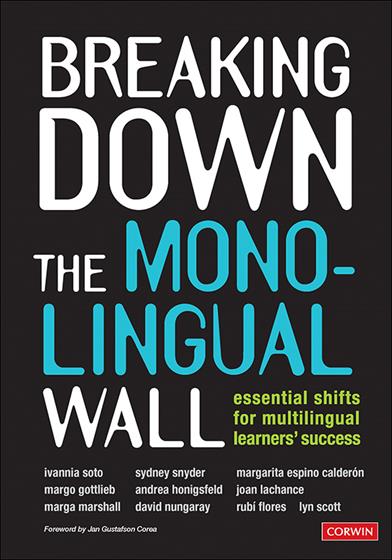Hands-on, Practical Guidance for Educators
From math,
literacy, science, equity, multilingual learners, and SEL, to assessment, school counseling,
and education leadership, our books are research-based and authored by experts
on topics most relevant to what educators are facing today.

Breaking Down the Monolingual Wall
Foreword by Jan Gustafson Corea
Outlining the systemic and pedagogical approaches necessary for successful multilingual and dual language programs, this book is an invaluable guide to creating dual language learning environments that build on the precious assets of our multilingual students and families.
- Grade Level: PreK-12
- ISBN: 9781071895535
- Published By: Corwin
- Year: 2023
- Page Count: 304
- Publication date: September 25, 2023
Review Copies
Review copies may be requested by individuals planning to purchase 10 or more copies for a team or considering a book for adoption in a higher ed course. Request review copy
Description
Your guide to culturally and linguistically sustaining practices in your dual language classroom and school.
It’s time to set the record straight: Multilingualism is a tremendous asset that must be nurtured and valued and the most effective pathway to multilingualism is dual language education. Despite significant evidence attesting to the cognitive, social/emotional, and economic benefits of multilingualism, the majority of our classrooms and schools are monolingual.
Encouragingly, recent shifts in state policies have increased the demand for dual language programming in our schools. This increased momentum brings new challenges, including the need for more bilingually authorized teachers, high-quality instructional resources, and accurate assessment and accountability in the target languages of instruction. With contributions from ten experts in multilingual education, Breaking Down the Monolingual Wall outlines the systemic and pedagogical approaches necessary for successful multilingual and dual language programs. The book supports educators to:
- Shift the paradigm from one that is subtractive and deficit-based to one that is additive and assets-based
- Embed culturally and linguistically sustaining practices in their instruction
- Understand how to promote multilingualism in the context of teaching academic content
- Develop assessments as, for, and of learning in multiple languages.
- Lead high-quality dual language schools and programs
- Recruit and retain highly qualified bilingual educators
Offering a comprehensive overview of bilingual policies and historical context all educators should understand, Breaking Down the Monolingual Wall is an invaluable guide to creating dual language learning environments that build on the precious assets of our multilingual students and families.
Author(s)
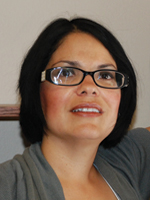
Ivannia Soto
Soto has authored and coauthored 12 books, including The Literacy Gaps: Bridge-Building Strategies for English Language Learners and Standard English Learners; ELL Shadowing as a Catalyst for Change, a best seller that was recognized by Education Trust–West as a promising practice for ELLs in 2018; Moving From Spoken to Written Language With ELLs; the Academic English Mastery four-book series; the Common Core Companion four-book series for English language development; Breaking Down the Wall; and Responsive Schooling for Culturally and Linguistically Diverse Students. Together, the books tell a story of how to equitably engage and include multilingual learners by ensuring that they gain voice and an academic identity in the classroom setting. Soto is executive director of the Institute for Culturally and Linguistically Responsive Teaching (ICLRT) at Whittier College, whose mission it is to promote relevant research and develop academic resources for ELLs and Standard English learners (SELs) via linguistically and culturally responsive teaching practices/

Sydney Snyder
over 25 years. She started her teaching career as a Peace Corps volunteer in Guinea, West Africa. This experience ignited her passion for language teaching, culturally responsive instruction, and ML advocacy. Dr. Snyder is coauthor of Culturally Responsive Teaching for Multilingual Learners: Tools for Equity and contributing author to Breaking Down the Monolingual Wall. She served as an English Teaching Fellow at Gadja Mada University in Yogyakarta, Indonesia. She earned her PhD in Multilingual/ Multicultural Education at George Mason University and her MAT in TESOL at the School for International Training. You can connect with her by email at Sydney@SupportEd.com or on Twitter at @SydneySupportEd.
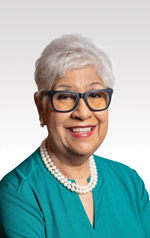
Margarita Espino Calderon
One of her empirical studies “The Bilingual Cooperative Integrated Reading and Composition (BCIRC)” is featured in the What Works Clearinghouse. The Carnegie Corporation of New York funded her five-year study to develop Expediting Comprehension for English Language Learners (ExC-ELL) to train math, science, social studies, language arts, and ESL teachers on integrating language, reading, and content in core content middle and high school classrooms. With a Title III National Professional Development grant, she implemented “A Whole-School Approach to Professional Development with ExC-ELL” in Loudoun County, VA. She replicated this approach in 29 schools in TX and NC. She served on the National Literacy Panel for Language Minority Children and Youth, the Carnegie Corporation of New York Panel on English Language Adolescent Literacy Panel, among other panels and national committees. She has over 100 publications on language, literacy, and professional development.
In 2025, Margarita was inducted into the Multilingual Education Hall of Fame.

Margo Gottlieb
Margo Gottlieb, Ph.D., has been a bilingual teacher, coordinator, facilitator, consultant, and mentor across K-20 settings. Having worked with universities, organizations, governments, states, school districts, networks, and schools, Margo has co-constructed linguistic and culturally sustainable curriculum and reconceptualized classroom assessment, policy, and practice. As co-founder and lead developer of WIDA at the University of Wisconsin-Madison in 2003, Margo has helped design and contributed to all the editions of WIDA’s English and Spanish language development standards frameworks and their derivative products. She has been appointed to national and state advisory boards, served as a Fulbright Senior Scholar, and was honored by the TESOL International Association in 2016 for her significant contribution to the field. An avid traveler, Margo has enjoyed keynoting and presenting across the United States, territories, and 25 countries. Having authored, co-authored, or co-edited over 100 publications, including 22 books, Margo's 3rd edition of Assessing Multilingual Learners: Bridges to Empowerment (2024) and Collaborative Assessment for Multilingual Learners and Teachers: Pathways to Partnerships (with A. Honigsfeld, 2025) are the latest additions to her Corwin compendium.
In 2025, Margo was inducted into the Multilingual Education Hall of Fame.
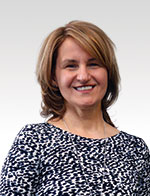
Andrea Honigsfeld
Andrea Honigsfeld, EdD, is a professor in the School of Education at Molloy College, Rockville Centre, New York. Before entering the field of teacher education, she was an English-as-a-foreign-language teacher in Hungary (Grades 5–8 and adult) and an English-as-a-second-language teacher in New York City (Grades K–3 and adult). She also taught Hungarian at New York University. She was the recipient of a doctoral fellowship at St. John’s University, New York, where she conducted research on individualized instruction. She has published extensively on working with multilingual learners and teacher collaboration. She received a Fulbright Award to lecture in Iceland in the fall of 2002. In the past 22 years, she has been presenting at conferences across the United States, China, Denmark, Japan, the Philippines, Sweden, Thailand, the United Kingdom, and the United Arab Emirates.
She coauthored Differentiated Instruction for At-Risk Students (2009) and coedited the five-volume Breaking the Mold of Education series (2010–2013), published by Rowman and Littlefield. She is also the coauthor of Core Instructional Routines: Go-To Structures for Effective Literacy Teaching, K–5 and 6–12 (2014), Growing Language and Literacy (K-8 and 6-12, 2019, 2024 respectively) published by Heinemann. With Maria G. Dove, she coedited Coteaching and Other Collaborative Practices in the EFL/ESL Classroom: Rationale, Research, Reflections, and Recommendations (2012), Co-teaching for English Learners: Evidence-based Practices and Research-informed Outcomes (2020), Portraits of collaboration: Educators working together to support multilingual learners (2022), and coauthored Collaboration and Co-Teaching: Strategies for English Learners (2010), Common Core for the Not-So-Common Learner, Grades K–5: English Language Arts Strategies (2013), Common Core for the Not-So-Common Learner, Grades 6–12: English Language Arts Strategies (2013), Beyond Core Expectations: A Schoolwide Framework for Serving the Not-So-Common Learner (2014), Collaboration and Co-Teaching: A Leader’s Guide (2015), Co-Teaching for English Learners: A Guide to Collaborative Planning, Instruction, Assessment, and Reflection (2018), Collaborating for English Learners: A Foundational Guide to Integrated Practices (2019), and Co-Planning: 5 Essential Practices to Integrate Curriculum and Instruction for English Learners (2022). She is a contributing author of Breaking Down the Wall: Essential Shifts for English Learner Success (2020), From Equity Insights to Action (2021), Digital-Age Teaching for English Learners (2022), Collaboration and Co-teaching for Dual Language Learners: Transforming Programs for Multilingualism and Equity (2023), Breaking Down the Monolingual Wall: Essential Shifts for Multilingual Learners’ Success (2024). Collaboration for Multilingual Learners with Exceptionalities: We Share the Students (2024), Collaborative Assessment for Multilingual Learners and Teachers: Pathways to Partnerships (2025), 9 Dimensions of Scaffolding for Multilingual Learners. Ten of her Corwin books are bestsellers.
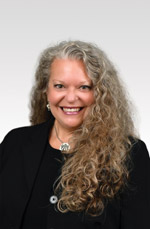
Joan Lachance
Dr. Joan Lachance is an Associate Professor of Teaching English as a Second Language (TESL) at the University of North Carolina at Charlotte. She directs the TESL graduate programs and undergraduate TESL Minor. She is the co-author of the National Dual Language Education Teacher Preparation Standards and the Director of the CAEP Specialized Program Association in Dual Language Education called “EMMA: Education for a Multilingual Multicultural America.” She received her undergraduate degree in Secondary Education, Modern Languages and Linguistics from Florida International University. With Spanish as the language of program delivery, she completed graduate coursework to earn her master’s degree in School Counseling from Pontifical Catholic University in Poncé, Puerto Rico. Dr. Lachance completed her doctoral work in Curriculum and Instruction, with an emphasis on Urban Education, Literacy, and TESL at the University of North Carolina at Charlotte.
Dr. Lachance’s research agenda encompasses dual language teacher preparation, academic literacy development, and authentic assessment with multilingual learners has resulted in over 25 publications including articles, book chapters, technical reports, and state-level curriculum guides since joining UNC Charlotte. She serves on several journal editorial boards and is a board member of the Multistate Association for Bilingual Education, Northeast (MABE). With the publication of her latest Corwin book she is specializing one aspect of her work further into collaboration and co-teaching for multilingual learners in the dual language context. She continues to work to support dual language education for the preservation of Native American languages, currently and most-honorably collaborating with a K-8 school serving the Eastern Band of the Cherokee Indians [EBCI].
In addition to her faculty position, Dr. Lachance’s service agenda has resulted in over 100 conference presentations, invited panels, keynotes, and roundtables to support the North Carolina Department of Public Instruction and the nation at-large. Her service specializes in professional learning for teachers, school counselors, and school administrators. She co-created materials and professional learning institutes for myriad North Carolina state-led initiatives including Using the WIDA Standards, The North Carolina Guide to the SIOP Model, The North Carolina Guide to ExC-ELL, and Dual Language/Immersion Program Support. The presentations, webinars, and asynchronous learning opportunities share innovative practices for multilingual learner academic language development, equitable active multilingual learner engagement, dual language program development, sociocultural nuances in school counseling, and international comparative education.
For fun, Dr. Lachance enjoys camping [it’s really glamping!] with her husband Carl, their son, and their two rescue dogs. She is passionate about science, astronomy, the outdoors, hiking in the Blue Ridge Mountains, and the preservation of the Appalachian Trail. While she lives and works in North Carolina, she shares her heart deeply with New Mexico and, has a passion for the Native American Pueblo Languages, their ways of living, and everything Hatch green chilies. Finally, she is a former dual language parent, who reached the point of watching multilingualism come to life in her own home.

Marga Marshall
Marga Marshall is an Educational Consultant with experience in bilingual education in Spain and California. She opened the first TK-8 Two Way Dual Immersion English/Spanish School in Concord, CA as part of the district’s Magnet schools. Prior to becoming a principal, Marga Marshall was a bilingual teacher, an instructional coach, an English Learners coach, and a Dual Language coach. As an educator for over 24 years, her passion is bilingualism , biliteracy, and offering students the opportunity to learn a second language. Marga Marshall has always developed relationships with the community, staff, and teachers. Her leadership also involves watching students grow, providing the opportunity to learn in a multicultural and collaborative environment through the emphasis on collaboration, critical and creative thinking, and supporting teachers and staff, so that they can reach their greatest potential while strengthening a connection between school and home, and fostering a positive school culture. Marga Marshall has presented at state and national conferences on best practices for the bilingual classroom, Creating Culturally Competent Schools, Number Talks in bilingual classrooms, Foundations for a Strong, Successful, and Sustainable Dual Language Program, Guiding Principles for Dual Language Education strategies, Foundations in Designated and Integrated ELD. Her work and collaboration with parents, community, and paraeducators has also led Marga Marshall to do online and in-person presentations for parents and paraeducators with strategies on how to support students during Distance Learning and at home and Biliteracy and Literacy Development from Home to School.
She was awarded the MDEA Community Involvement Award during the 2015-2016 school year and she is also the recipient of the MDEA Outstanding Administrator Award for the 2017-2018 and 2020-2021 school years. She was also nominated as the ACSA Region 6 Elementary Principal of the Year for the 2018-2019 school year.
During her leadership at Holbrook Language Academy, her school was voted best Bilingual School by Parents Press for three consecutive years, and she wrote the entry for the CSBA Golden Bell Awards - an award that promotes excellence in education by recognizing outstanding programs - leading Holbrook Language Academy to be the recipient of the 2021 Golden Bell Award in the Category of English Learners/Biliteracy. As an Educational Bilingual Consultant, Marga Marshall partners with districts providing expert, customized consulting, and professional learning in the areas of biliteracy and English Learner education.
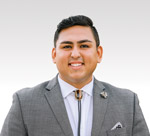
David Nungaray
David Nungaray is a forever dual language teacher and school leader at heart no matter what his current work title is. The children and families he worked with as an educator are one of his guiding forces in the work he continues to do in education. As a son of Mexican immigrants, native Spanish speaker, gay educator, and a first-generation college graduate, David is passionate about educational excellence and ensuring school systems best meet the needs of all learners. David began his journey in education as a founding corps member of Teach For America-San Antonio in 2010 where he served as a 4th dual language teacher. In his first year of teaching, David was the district’s Elementary Rising Star Teacher of the Year. Currently, David works as a bilingual consulting partner at a national non-profit where he oversees partnerships in Texas and supports national strategy to integrate multilingual learners into all of the work at the organization. David has led teams focused on partnering with districts through strategic planning, (bi)literacy visioning and implementation, dual language supports, stakeholder and family engagement, high-impact tutoring, learning acceleration, and state-wide high-quality instructional materials adoption. With almost 13 years of experience in education, David served as the principal of one of the flagship dual language schools in San Antonio ISD (SAISD) prior to his time at TNTP. During his tenure as principal, the school community revised and renewed their in-district school charter and established a partnership with the University of Texas-San Antonio to create the first dual language teacher residency lab network of schools in Texas. David also served as co-chair of the Bexar County COVID-19 Pre-K-12 Consultation group in San Antonio, focused on guiding the reopening of schools in the county. Prior to his role as principal, David co-founded one of the first schools in the Innovation Zone of SAISD, which spanned Pre K-12th grade, as associate principal. The school focuses on project-based learning and also has a teaching and school administrator residency model. David serves on multiple non-profit boards focused on education, and he holds his Masters in School Leadership from Trinity University, where he has served as an adjunct professor in multilingual education, school leadership, and special education.
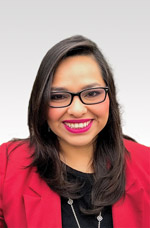
Rubí Flores
Rubí P. Flores Torres, M.A. is a native from San Luis Potosí, Mexico, Rubí is the Director of Professional Learning at the California Association for Bilingual Education. She has extensive expertise working with schools on implementing and refining Dual Language and Multilingual Learner Programs. Prior to this role, Rubí has served as a bilingual teacher, ESL specialist, dual language teacher, dual language instructional coach, dual language program coordinator and biliteracy curriculum developer. She has worked in schools across Texas, Oklahoma, El Salvador, and California. She earned a Bachelor's Degree in Bilingual Education from Texas State University and a Master’s Degree in Bilingual and Bicultural Curriculum and Instruction from the University of Texas at Austin. She is a member of the Proyecto Maestría leadership development program through the University of Texas. Rubí holds a Multiple Subject teaching credential with a Bilingual Teacher Authorization in California and in Texas. She has presented her work with dual language programs and biliteracy instruction at CABE, NABE, TABE, Adelante! Dual Language Conference, La Cosecha, CARLA and at multiple county and district level conferences and events in California, Texas, and México. Her current work focuses on developing teacher capacity to support multilingual learners through coaching, presenting authentic methods for biliteracy instruction, and teaching strategies to support Spanish and English academic language development in Dual Language and Multilingual Learner settings. As an immigrant and first generation college graduate, Rubí is committed to honoring her parents’ courage to seek a better future by creating and advocating for culturally sustaining and high quality professional learning programs that will promote linguistic justice for multilingual learners. Connect with Rubí at thebiliteracycoach@gmail.com

Lyn Scott
Lyn Scott, Ph.D., a native of the rural Midwest, is a credentialed dual language teacher in Massachusetts and California teaching in two-way immersion and transitional bilingual education classrooms for over two decades. As an elementary teacher he joined colleagues and parents in restructuring their neighborhood public school into a multi-aged, dual language immersion public school. Inspired by the work of Paulo Freire, he immersed himself in the Brazilian culture early in his teaching journey, reflecting on adult literacy pedagogies relevant to the dual language development of young learners in American schools. Lengthy experiences in Taiwan, China, and Sweden stimulated his curiosity in national language policies impacting language diversity, schooling, and migration. His advocacy for linguistic human rights includes all students having access to education in their home language in addition to English and other languages. His doctoral dissertation at the University of California, Berkeley, investigated language policy in Mexican American homes in Arizona and California. Since 2012 he has served as a faculty member of the California State University system, currently an Associate Professor in the Department of Teacher Education at Cal State East Bay. He is past president of the California Association for Bilingual Teacher Education and co-author of Community-Owned Knowledge; The Promise of Collaborative Action Research published in 2022. He is biliterate in Spanish, Portuguese, Swedish, and English and conversational in Mandarin Chinese.
Table of Contents
Dedication
Acknowledgements
Publisher's Acknowledgements
About the Authors
Foreword by Jan Gustafson-Corea
Chapter 1: From Subtractive Schooling Models to Dual Language Models that Lead to Linguistic and Cultural Equity
Chapter 2: From Culturally and Linguistically Subtractive to Culturally and Linguistically Sustaining Pedagogy
Chapter 3: From One Language to Biliteracy and Content in Two Languages
Chapter 4: From Monolingual Assessment to Assessment in Multiple Languages
Chapter 5: From Educator Collaboration in a Monolingual Setting to Collaboration in a Dual Language Setting
Chapter 6: From Leading in a Monolingual Program to Leading in a Dual Language Program
Chapter 7: From "One Size Fits All" Workshops to Job-Embedded Professional Learning for Dual Language Teachers
Chapter 8: From Monolingual Policies to Dual Language Policies
Reviews
"This book is a “one place stop” per se for implementing DLE effectively, whereby educators can set the conditions right for students to thrive academically, socially, and emotionally. The content within this book provides a DLE vision where thirvability is the outcome for every leader, educator, student, and community."Analis Carattini-Ruiz
K-12 Administration, Alpine School District
"This book is a must-read for anyone who makes decisions that affect Dual Language programs including principals and assistant principals, program directors, curriculum directors, professional learning directors, assistant superintendents, superintendents and school board members."
Marion Friebus-Flaman"This book is a must-read for anyone who makes decisions that affect Dual Language programs including principals and assistant principals, program directors, curriculum directors, professional learning directors, assistant superintendents, superintendents and school board members."
Director of Language Acquisition Services, Naperville Community Unit School District 20
"The authors of this book have collectively brought together an outstanding resource on the value of multilingualism and dual language programs. This book delves into practical solutions to common concerns, helps both teachers and leaders engage the students and families they serve, and provides structural guidance as well as historical and current perspectives for us to consider. Whether you already have a dual language program in your school(s) or are considering implementing a dual language program, this book will help you create positive change and engage your community and stakeholders more fully. Most importantly, this book is likely to be a resource you will revisit multiple times for its innovative ideas and support of our multilingual students of all language backgrounds."Elizabeth Scaduto
Director of ENL/ESL K-12, Riverhead Central School District
"Not only will this book be a necessary item for our leaders and educators’ libraries, but it will be an essential text for any educator or leader that works and supports multilingual leaners."Christine Kennedy
District Program Facilitator, Multilingual Department, Minneapolis Public Schools
Review Copies
Review copies may be requested by individuals planning to purchase 10 or more copies for a team or considering a book for adoption in a higher ed course. Request review copy
Related Professional Learning
Related WebinarsRelated Resources
- Access to companion resources is available with the purchase of this book.
-
The Gift of Multilingualism
[Book Excerpt]
Other Titles in: Bilingual/ELL Learners | Teaching Strategies for Diverse Students | Cultural Competence
